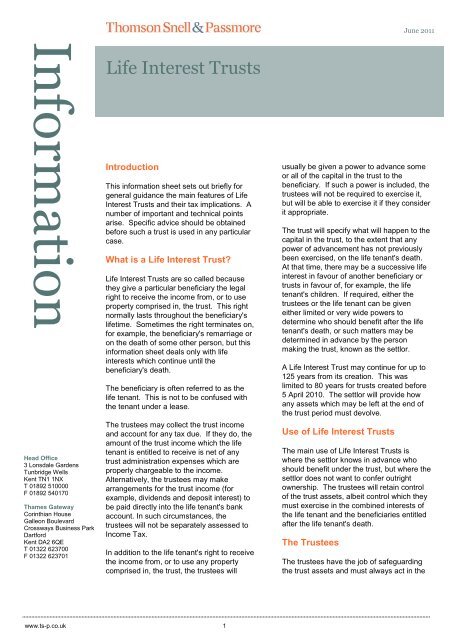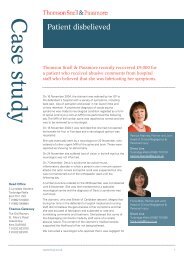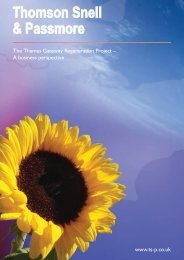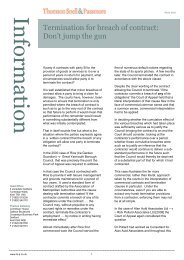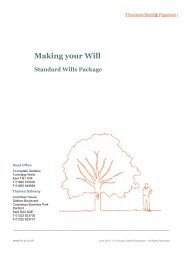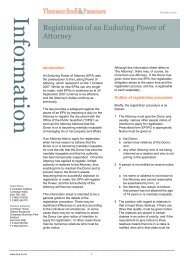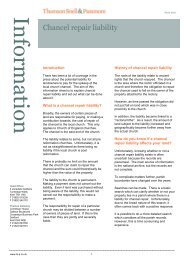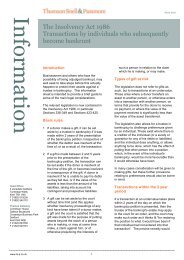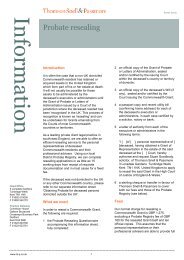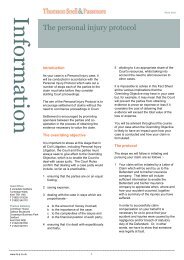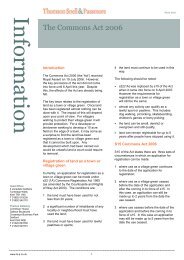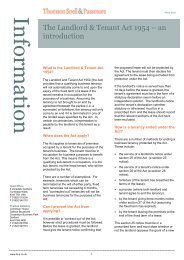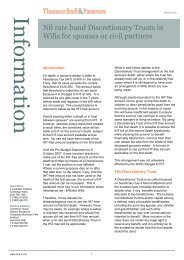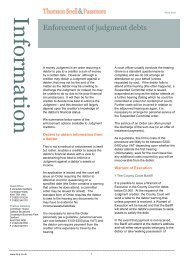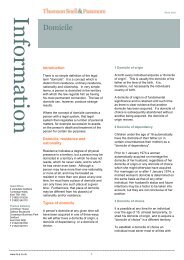Life Interest Trusts - Thomson Snell and Passmore
Life Interest Trusts - Thomson Snell and Passmore
Life Interest Trusts - Thomson Snell and Passmore
Create successful ePaper yourself
Turn your PDF publications into a flip-book with our unique Google optimized e-Paper software.
Information<br />
June 2011<br />
<strong>Life</strong> <strong>Interest</strong> <strong>Trusts</strong><br />
Head Office<br />
3 Lonsdale Gardens<br />
Tunbridge Wells<br />
Kent TN1 1NX<br />
T 01892 510000<br />
F 01892 540170<br />
Thames Gateway<br />
Corinthian House<br />
Galleon Boulevard<br />
Crossways Business Park<br />
Dartford<br />
Kent DA2 6QE<br />
T 01322 623700<br />
F 01322 623701<br />
Introduction<br />
This information sheet sets out briefly for<br />
general guidance the main features of <strong>Life</strong><br />
<strong>Interest</strong> <strong>Trusts</strong> <strong>and</strong> their tax implications. A<br />
number of important <strong>and</strong> technical points<br />
arise. Specific advice should be obtained<br />
before such a trust is used in any particular<br />
case.<br />
What is a <strong>Life</strong> <strong>Interest</strong> Trust?<br />
<strong>Life</strong> <strong>Interest</strong> <strong>Trusts</strong> are so called because<br />
they give a particular beneficiary the legal<br />
right to receive the income from, or to use<br />
property comprised in, the trust. This right<br />
normally lasts throughout the beneficiary's<br />
lifetime. Sometimes the right terminates on,<br />
for example, the beneficiary's remarriage or<br />
on the death of some other person, but this<br />
information sheet deals only with life<br />
interests which continue until the<br />
beneficiary's death.<br />
The beneficiary is often referred to as the<br />
life tenant. This is not to be confused with<br />
the tenant under a lease.<br />
The trustees may collect the trust income<br />
<strong>and</strong> account for any tax due. If they do, the<br />
amount of the trust income which the life<br />
tenant is entitled to receive is net of any<br />
trust administration expenses which are<br />
properly chargeable to the income.<br />
Alternatively, the trustees may make<br />
arrangements for the trust income (for<br />
example, dividends <strong>and</strong> deposit interest) to<br />
be paid directly into the life tenant's bank<br />
account. In such circumstances, the<br />
trustees will not be separately assessed to<br />
Income Tax.<br />
In addition to the life tenant's right to receive<br />
the income from, or to use any property<br />
comprised in, the trust, the trustees will<br />
usually be given a power to advance some<br />
or all of the capital in the trust to the<br />
beneficiary. If such a power is included, the<br />
trustees will not be required to exercise it,<br />
but will be able to exercise it if they consider<br />
it appropriate.<br />
The trust will specify what will happen to the<br />
capital in the trust, to the extent that any<br />
power of advancement has not previously<br />
been exercised, on the life tenant's death.<br />
At that time, there may be a successive life<br />
interest in favour of another beneficiary or<br />
trusts in favour of, for example, the life<br />
tenant's children. If required, either the<br />
trustees or the life tenant can be given<br />
either limited or very wide powers to<br />
determine who should benefit after the life<br />
tenant's death, or such matters may be<br />
determined in advance by the person<br />
making the trust, known as the settlor.<br />
A <strong>Life</strong> <strong>Interest</strong> Trust may continue for up to<br />
125 years from its creation. This was<br />
limited to 80 years for trusts created before<br />
5 April 2010. The settlor will provide how<br />
any assets which may be left at the end of<br />
the trust period must devolve.<br />
Use of <strong>Life</strong> <strong>Interest</strong> <strong>Trusts</strong><br />
The main use of <strong>Life</strong> <strong>Interest</strong> <strong>Trusts</strong> is<br />
where the settlor knows in advance who<br />
should benefit under the trust, but where the<br />
settlor does not want to confer outright<br />
ownership. The trustees will retain control<br />
of the trust assets, albeit control which they<br />
must exercise in the combined interests of<br />
the life tenant <strong>and</strong> the beneficiaries entitled<br />
after the life tenant's death.<br />
The Trustees<br />
The trustees have the job of safeguarding<br />
the trust assets <strong>and</strong> must always act in the<br />
www.ts-p.co.uk 1
June 2011<br />
<strong>Life</strong> <strong>Interest</strong> <strong>Trusts</strong> (continued)<br />
best interests of the beneficiaries.<br />
Particularly if the trustees are given powers<br />
to advance capital to the life tenant or to<br />
dictate what will happen after the life<br />
tenant's death, care must be taken in<br />
choosing the trustees. The life tenant can<br />
be a trustee, but should not be given power<br />
to act as a sole trustee. If required, the<br />
settlor can act as a trustee.<br />
Tax implications<br />
The Inheritance Tax (IHT) <strong>and</strong> Capital<br />
Gains Tax (CGT) rules affecting <strong>Life</strong> <strong>Interest</strong><br />
<strong>Trusts</strong> were radically changed by the 2006<br />
Finance Act, taking effect from Budget day<br />
on 22 March 2006.<br />
1 IHT<br />
With the exception of new trusts for some<br />
disabled persons, the creation during<br />
lifetime of a <strong>Life</strong> <strong>Interest</strong> Trust on or after 22<br />
March 2006 is treated as a chargeable<br />
transfer by the settlor <strong>and</strong> the Discretionary<br />
Trust charging regime will apply to the trust.<br />
These aspects are dealt with in the<br />
information sheet Discretionary <strong>Trusts</strong>.<br />
For trusts made before 22 March 2006,<br />
while the existing life interest continues the<br />
trust assets are still treated for IHT<br />
purposes as being comprised in the life<br />
tenant's estate. On the life tenant's death,<br />
subject to any exemptions or reliefs which<br />
then apply, IHT will be payable on the<br />
combined value of the trust assets <strong>and</strong> the<br />
life tenant's own estate. The trustees will be<br />
responsible for paying the proportion of the<br />
IHT payable in relation to the trust assets.<br />
These rules also apply where a life interest<br />
in existence at 22 March 2006 was replaced<br />
before 6 October 2008 by a successive life<br />
interest or, from that date onwards, if the<br />
successive life interest arises on death <strong>and</strong><br />
is in favour of the surviving spouse*.<br />
A life interest arising on death in a Will or<br />
under the intestacy rules will also largely be<br />
governed by the pre-2006 Budget IHT rules,<br />
with the life tenant being treated as owning<br />
the trust assets.<br />
If the life tenant uses the trust assets in<br />
connection with the life tenant's business or<br />
farming, Business or Agricultural Property<br />
Relief may be available to the trustees.<br />
2 CGT<br />
The trustees will be liable to CGT currently<br />
at 28% (subject to any entrepreneurs relief)<br />
in respect of any gains exceeding the<br />
trustees' available annual exemption,<br />
presently a maximum of one half of the<br />
individual’s annual exemption.<br />
Under a trust created before 22 March<br />
2006, on the original life tenant's death the<br />
base value of the trust assets will usually be<br />
uplifted to their then value without any CGT<br />
charge. This uplift wipes out any unrealised<br />
gains (except any which have been held<br />
over by the settlor to the trustees). The<br />
same treatment will apply to a successive<br />
life interest which arose before 6 October<br />
2008, <strong>and</strong> to life interests arising<br />
subsequently on the death of a spouse. In<br />
almost all other cases there will now be no<br />
CGT rebasing on the life tenant's death.<br />
The transfer of chargeable assets into a <strong>Life</strong><br />
<strong>Interest</strong> Trust will be a disposal for CGT by<br />
the settlor. Any liability to CGT will depend<br />
on the settlor's own circumstances. For<br />
gifts on or after 22 March 2006 any gains<br />
accruing to the settlor may be held over<br />
<strong>and</strong>, in effect, transferred to the trustees<br />
(except as mentioned below). This is more<br />
www.ts-p.co.uk 2
June 2011<br />
<strong>Life</strong> <strong>Interest</strong> <strong>Trusts</strong> (continued)<br />
favourable than for gifts before that date, in<br />
respect of which hold-over relief was only<br />
available for business assets.<br />
Where the settlor has retained an interest in<br />
the trust as a possible beneficiary, it is not<br />
possible to hold over gains, even in<br />
business assets, to the trust. A settlor is<br />
regarded as having an interest if there are<br />
any circumstances in which the assets<br />
within the trust or the income arising to the<br />
trustees may become payable to the settlor<br />
or to his/her spouse. The settlor will also be<br />
regarded as having an interest if his/her<br />
minor <strong>and</strong> unmarried children or<br />
stepchildren can benefit.<br />
Should any beneficiary become entitled<br />
outright to the trust assets, the trustees will<br />
be treated as if they had disposed of them.<br />
Whether or not hold-over relief will be<br />
available will depend (except in the case of<br />
business assets) on how <strong>and</strong> when the trust<br />
was made.<br />
3 Income Tax<br />
The trustees are generally subject to<br />
Income Tax at the basic rate, presently<br />
20%, but pay at 10% in relation to dividends<br />
(satisfied by a tax credit). The trustees are<br />
not eligible for any personal allowances, nor<br />
can they deduct any trust administration<br />
expenses when calculating their tax liability.<br />
If the life tenant who is entitled to receive<br />
the income is taxable at the higher or top<br />
rates, the life tenant will have to account to<br />
HMRC for a further tax. A life tenant who is<br />
a non-taxpayer may reclaim any tax<br />
previously paid by the trustees (except the<br />
10% dividend tax credit).<br />
If the settlor or his/her spouse is a possible<br />
beneficiary, all the trust income will normally<br />
be taxed in the settlor's h<strong>and</strong>s during the<br />
settlor's lifetime.<br />
If income is payable from the trust to a<br />
minor, unmarried child or stepchild of the<br />
settlor, it will also be taxed in the settlor's<br />
h<strong>and</strong>s.<br />
Administration<br />
A <strong>Life</strong> <strong>Interest</strong> Trust needs to be properly<br />
administered. This usually involves the<br />
trustees filing annual Tax Returns <strong>and</strong><br />
issuing tax deduction certificates to the life<br />
tenant, unless all the trust income is paid<br />
directly to the life tenant <strong>and</strong> assessed on<br />
the life tenant. The trustees should also<br />
maintain trust accounts <strong>and</strong> properly<br />
manage the trust's property or investments.<br />
The amount of administrative work will<br />
depend on the nature of the trust assets.<br />
Conclusion<br />
A <strong>Life</strong> <strong>Interest</strong> Trust may be suitable for an<br />
individual who wishes to transfer assets for<br />
the benefit of one or more particular<br />
beneficiaries without giving them outright<br />
control of the assets. Although there will be<br />
no discretion about the payment of the<br />
income, at least during the life tenant's<br />
lifetime, such trusts can otherwise be drawn<br />
rigidly or flexibly. The trustees can be given<br />
powers partially or completely to terminate<br />
the life tenant's income entitlement <strong>and</strong> to<br />
reallocate it, or even to create new trusts.<br />
Disclaimer<br />
This information sheet is written as a<br />
general guide. As any course of action<br />
must depend on your individual<br />
circumstances, you are strongly<br />
www.ts-p.co.uk 3
June 2011<br />
<strong>Life</strong> <strong>Interest</strong> <strong>Trusts</strong> (continued)<br />
recommended to obtain specific<br />
professional advice before you proceed.<br />
We do not accept any responsibility for<br />
action which may be taken as a result of<br />
having read this information sheet.<br />
NOTE: The law is stated as at 6 April 2011.<br />
If you require further information, please<br />
contact Mark Politz, Stuart Goodbody or<br />
Simon Brown on 01892 510000 or by email<br />
at:<br />
mark.politz@ts-p.co.uk<br />
stuart.goodbody@ts-p.co.uk<br />
simon.brown@ts-p.co.uk<br />
* All references to the term "spouse" include<br />
a civil partner as defined by Section 1 of the<br />
Civil Partnership Act 2004<br />
© <strong>Thomson</strong> <strong>Snell</strong> & <strong>Passmore</strong> LLP All Rights Reserved<br />
www.ts-p.co.uk 4


